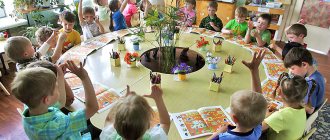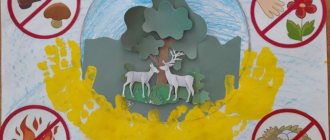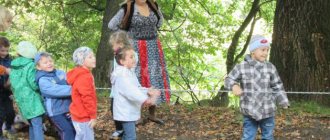Lesson on ecology in the senior group of kindergarten “Journey to the Museum of Nature” (winter)
Municipal state preschool educational institution
"Kindergarten No. 14" combined type
Lesson on ecology in the senior group of kindergarten “Journey to the Museum of Nature” (winter)
Completed by: Nadezhda Ivanovna Mingaleva,
teacher
Ust-Katav, 2021
Target:
to teach the ability to understand and evaluate natural phenomena and their impact on the child’s emotional state.
Tasks:
Educational:
- generalize and systematize children’s knowledge about the signs of winter;
- expand children’s understanding of winter and natural phenomena;
- improve the ability to construct your statements grammatically correctly;
— continue to develop in children the ability to perform simple experiments;
— to develop children’s ability to coordinate movements with text, understand and follow verbal instructions;
Educational:
- develop the ability to use a complex sentence with the conjunction because;
— continue to develop mental processes: memory, attention, visual-figurative thinking.
— develop general speech skills (clear diction, correct pronunciation)
- develop concentration on 1-2 objects (comparison, story about an ongoing phenomenon)
Educational:
— cultivate a kind, caring attitude towards nature, lay the foundations of environmental education;
— teach politeness, tact, mutual assistance, friendly attitude, and a sense of teamwork.
Equipment:
Sound recording of the piano miniature “Morning” by S. Prokofiev
, object pictures depicting winter, an envelope with cut letters, a laptop, ice, salted ice, frozen vegetable oil, a projector, an audio letter, a slide with encrypted animals, an accompanying presentation
Progress of the lesson
IN.
Let's stand in a circle and remember the game (children stand in a circle, holding hands), “On this day and at this hour, everything will work out for us.”
We will have an interesting game today, each of you was preparing for it. Get ready kids, it's time to travel.
IN.
Are you wondering where we are going on a trip today? Me too. And in order to find out the route you need to complete the task.
Among the letters there are two necessary words, find them.
A F M U Z E Y B U S
Y I T O D E F S SCH U
J V R D C M X F G E
PRI R O D Y O E R
M T P A F E L R O T
IN
. Where do you think we will go today?
D.
To the Museum of Nature.
IN.
Absolutely right, do you agree?
Riddles will help you guess which hall we will go to. Figure out what we are talking about.
He entered - no one saw, He said - no one heard, He blew through the windows and disappeared, And a forest grew on the windows……… (frost).
IN.
Explain why you think so?
Trees in white velvet - And fences and trees. And when the wind attacks, This velvet will fall off……… (frost).
IN.
Why do you think it's frost?
He flies in a white flock and sparkles in flight. It melts like a cool star in the palm of your hand and in your mouth……….. (snow).
IN
. Explain why it's snowing?
Troika, troika flew in. The horses in that troika were white, And in the sleigh sat a girl, White-haired, white-faced. As she waved her sleeve, Everything was covered with silver, Snow-White herself hurried to us……… .(winter).
Well done! Of course, our path lies in the Winter Hall of the Museum of Nature.
(Children pass and sit on chairs, on the screen there is a slide with a winter landscape
).
IN
.
Guys, be quiet! Otherwise, you won't be able to hear the beautiful sounds of winter. (music sounds - piano miniature “Morning” by S. Prokofiev
).
IN
. What sounds do you hear in the winter forest?
D
. The wind is blowing, the trees are creaking, cracking from the frost, birds are chirping, animal voices, the snow is creaking.
IN.
What words can describe winter air?
D
. Cold, prickly, ringing, crystal, transparent.
IN
. What do you think birds talk about in winter?
D
. It’s cold, I wish it was spring soon, we need to hatch the chicks, it’s very windy.
IN.
What is the winter wind like?
D.
Strong, icy, quiet, hard, prickly.
Fizminutka
.
- Now we will turn into the wind. Let's all stand up and blow like a strong, cold wind is blowing (children puff out their cheeks and blow with all their might
).
- Show what people do when such a wind blows on them (children
shudder, tap their feet
).
— How does the weak winter breeze blow? In the north of our country, such a breeze is affectionately called “Siverko” (children show how such a breeze blows).
IN
. Now let's take our seats. Tell me, what do we call a strong wind with snow?
D
. Blizzard, blizzard, blizzard.
IN
. What is the most important sign of winter?
D.
Snow.
IN
. Where does snow come from?
D
. He delivers from a cloud, the snow is frozen rain.
IN.
But how many of you know why the snow crunches under your feet?
(children's answers).
IN
. It crunches because the stars and rays break under the weight of your body.
— Now I invite you to the laboratory of the museum ( Children go to the tables
,
stand around. A slide with snowflakes on the screen
.)
Experiment “Freezing of liquid
”.
IN.
Let's see, today I froze water, salt water, vegetable oil.
.
. Let's now see what we've got (children look at containers with frozen liquids).
— The water is frozen. The salt water froze, but not completely. The vegetable oil did not freeze, but only thickened.
Conclusion:
This means that plain water freezes faster than salted water, and it will take even longer to freeze vegetable oil.
IN
. Look at the painting depicting winter. How the earth has changed!
And the forest stands mysterious, And the forest stands mysterious, Silence is silent... Little animals and little birds - Winter hid them all.
IN.
Think and tell me, who and where did winter hide in the forest?
D
. Insects in the bark of trees, snakes, mice in holes, a bear in a den, hares and squirrels changed their fur coats.
IN
. Winter did a great job. Only the birds and animals that do not fall asleep to the song of the wind find it difficult and hungry during these months.
- Why?
D
. It’s very cold, there’s a lot of snow, food is picking up, crust is forming.
IN
.
Conclusion
: it means that life is very difficult for all animals in winter.
Surprise moment
(sound letter, bird on the screen
).
IN
.
Look guys! I have a letter for you. Shall we read it? (the teacher opens an envelope with a picture of a bird and takes out a letter from there).
- What is this, shall we read it?
“Dear Guys! I flew to you from the forest for help. Will you help the birds?”
IN
. Guys, how can you help birds in winter?
D.
Hang feeders, feed the birds every day, give the tits lard, and the bullfinches rowan berries.
“Thank you for your knowledge and care for us and I invite you to listen to the bird song
”.
The sound of birds singing
Children imitate the flight of birds and sit on chairs at the end of the dance..
IN
. Are you guys interested in the Museum of Nature? What new and interesting things did you learn today? Can anyone be surprised by the richness of this museum?
D.
No, only attentive, sensitive guys can do this.
IN
. Now we will see how attentive you are (attention task).
(slide with encrypted animals).
IN.
There are animals hiding in the forest, look carefully and find them.
(squirrel, fox, wolf, hare, swallow, butterfly
).
IN
. Which of these animals do you think can be seen in the forest in winter? And which ones are not in the forest in winter? (children's answers)
IN
. Well, it’s time to leave another entry in the nature museum’s guest book. What did you like about the nature museum, what was difficult for you, and what was easy?
D.
They give their answers.
Well done! We tried very hard. And now our excursion has come to an end.
A F M U Z E Y B U S
Y I T O D E F S
J V R D C M X F G E
PRI R O D Y O E R
M T P A F E L R O T


